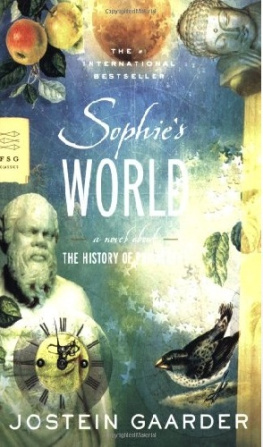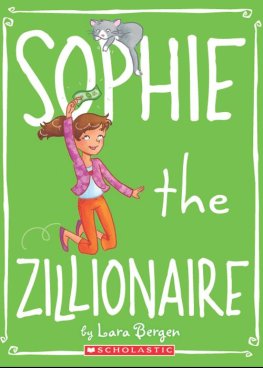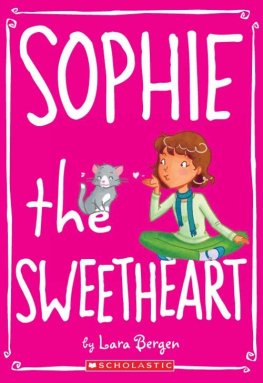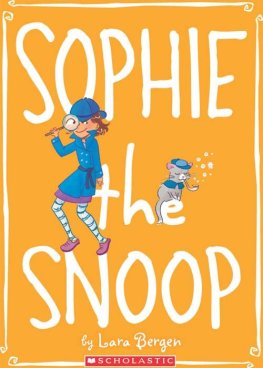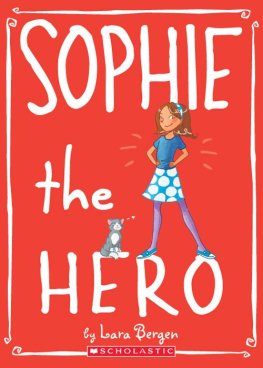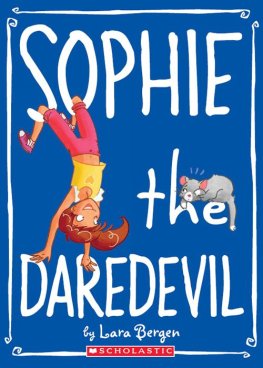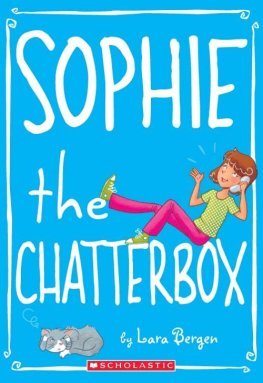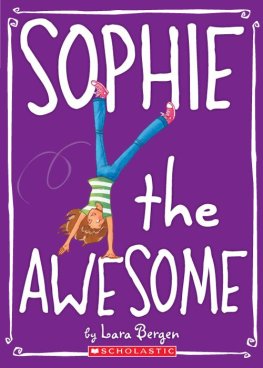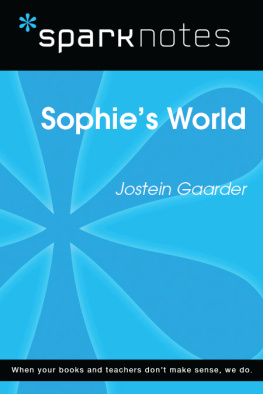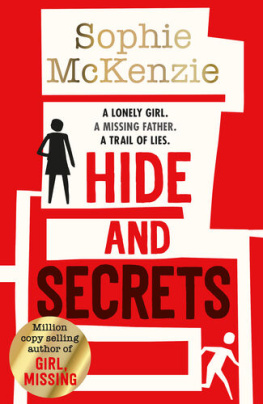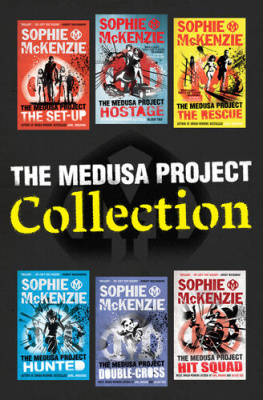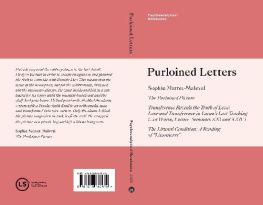Sophies World
A Novel About the History of Philosophy
Jostien Gaarder
An extraordinary writer. Madeleine LEngle
Translated by Paulette Miller
BERKLEY BOOKS, NEW YORK
ISBN: 0-425-15225-1
Acknowledgments
This book would not have been possible without the support and encouragement of Siri Dan-nevig. Thanks are also due to Maiken Ims for reading the manuscript and making useful comments, and to Trond Berg Eriksen for his trenchant observations and knowledgeable support through the years.
J.G.
He who cannot draw on three thousand years
Is living from hand to mouth
GOETHE
THE GARDEN OF EDEN
at some point something must have come from nothing
Sophie Amundsen was on her way home from school. She had walked the first part of the way with Joanna. They had been discussing robots. Joanna thought the human brain was like an advanced computer. Sophie was not certain she agreed. Surely a person was more than a piece of hardware?
When they got to the supermarket they went their separate ways. Sophie lived on the outskirts of a sprawling suburb and had almost twice as far to school as Joanna. There were no other houses beyond her garden, which made it seem as if her house lay at the end of the world. This was where the woods began.
She turned the corner into Clover Close. At the end of the road there was a sharp bend, known as Captains Bend. People seldom went that way except on the weekend.
It was early May. In some of the gardens the fruit trees were encircled with dense clusters of daffodils. The birches were already in pale green leaf.
It was extraordinary how everything burst forth at this time of year! What made this great mass of green vegetation come welling up from the dead earth as soon as it got warm and the last traces of snow disappeared?
As Sophie opened her garden gate, she looked in the mailbox. There was usually a lot of junk mail and a few big envelopes for her mother, a pile to dump on the kitchen table before she went up to her room to start her homework.
From time to time there would be a few letters from the bank for her father, but then he was not a normal father. Sophies father was the captain of a big oil tanker, and was away for most of the year. During the few weeks at a time when he was at home, he would shuffle around the house making it nice and cozy for Sophie and her mother. But when he was at sea he could seem very distant.
There was only one letter in the mailboxand it was for Sophie. The white envelope read: Sophie Amundsen, 3 Clover Close. That was all; it did not say who it was from. There was no stamp on it either.
As soon as Sophie had closed the gate behind her she opened the envelope. It contained only a slip of paper no bigger than the envelope. It read: Who are you?
Nothing else, only the three words, written by hand, and followed by a large question mark.
She looked at the envelope again. The letter was definitely for her. Who could have dropped it in the mailbox?
Sophie let herself quickly into the red house. As always, her cat Sherekan managed to slink out of the bushes, jump onto the front step, and slip in through the door before she closed it behind her.
Whenever Sophies mother was in a bad mood, she would call the house they lived in a menagerie. A menagerie was a collection of animals. Sophie certainly had one and was quite happy with it. It had begun with the three goldfish, Goldtop, Red Ridinghood, and Black Jack. Next she got two budgerigars called Smitt and Smule, then Govinda the tortoise, and finally the marmalade cat Sherekan. They had all been given to her to make up for the fact that her mother never got home from work until late in the afternoon and her father was away so much, sailing all over the world.
Sophie slung her schoolbag on the floor and put a bowl of cat food out for Sherekan. Then she sat down on a kitchen stool with the mysterious letter in her hand.
Who are you?
She had no idea. She was Sophie Amundsen, of course, but who was that? She had not really figured that outyet.
What if she had been given a different name? Anne Knutsen, for instance. Would she then have been someone else?
She suddenly remembered that Dad had originally wanted her to be called Lillemor. Sophie tried to imagine herself shaking hands and introducing herself as Lillemor Amundsen, but it seemed all wrong. It was someone else who kept introducing herself.
She jumped up and went into the bathroom with the strange letter in her hand. She stood in front of the mirror and stared into her own eyes.
I am Sophie Amundsen, she said.
The girl in the mirror did not react with as much as a twitch. Whatever Sophie did, she did exactly the same. Sophie tried to beat her reflection to it with a lightning movement but the other girl was just as fast.
Who are you? Sophie asked.
She received no response to this either, but felt a momentary confusion as to whether it was she or her reflection who had asked the question.
Sophie pressed her index finger to the nose in the mirror and said, You are me.
As she got no answer to this, she turned the sentence around and said, I am you.
Sophie Amundsen was often dissatisfied with her appearance. She was frequently told that she had beautiful almond-shaped eyes, but that was probably just something people said because her nose was too small and her mouth was a bit too big. And her ears were much too close to her eyes. Worst of all was her straight hair, which it was impossible to do anything with. Sometimes her father would stroke her hair and call her the girl with the flaxen hair, after a piece of music by Claude Debussy. It was all right for him, he was not condemned to living with this straight dark hair. Neither mousse nor styling gel had the slightest effect on Sophies hair. Sometimes she thought she was so ugly that she wondered if she was malformed at birth. Her mother always went on about her difficult labor. But was that really what determined how you looked?
Wasnt it odd that she didnt know who she was? And wasnt it unreasonable that she hadnt been allowed to have any say in what she would look like? Her looks had just been dumped on her. She could choose her own friends, but she certainly hadnt chosen herself. She had not even chosen to be a human being.
What was a human being?
Sophie looked up at the girl in the mirror again.
I think Ill go upstairs and do my biology homework, she said, almost apologetically. Once she was out in the hall, she thought, No, Id rather go out in the garden.
Kitty, kitty, kitty!
Sophie chased the cat out onto the doorstep and closed the front door behind her.
As she stood outside on the gravel path with the mysterious letter in her hand, the strangest feeling came over her. She felt like a doll that had suddenly been brought to life by the wave of a magic wand.
Wasnt it extraordinary to be in the world right now, wandering around in a wonderful adventure!
Sherekan sprang lightly across the gravel and slid into a dense clump of red-currant bushes. A live cat, vibrant with energy from its white whiskers to the twitching tail at the end of its sleek body. It was here in the garden too, but hardly aware of it in the same way as Sophie.
As Sophie started to think about being alive, she began to realize that she would not be alive forever. I am in the world now, she thought, but one day I shall be gone.
Was there a life after death? This was another question the cat was blissfully unaware of.
It was not long since Sophies grandmother had died. For more than six months Sophie had missed her every single day. How unfair that life had to end!
Sophie stood on the gravel path, thinking. She tried to think extra hard about being alive so as to forget that she would not be alive forever. But it was impossible. As soon as she concentrated on being alive now, the thought of dying also came into her mind. The same thing happened the other way around: only by conjuring up an intense feeling of one day being dead could she appreciate how terribly good it was to be alive. It was like two sides of a coin that she kept turning over and over. And the bigger and clearer one side of the coin became, the bigger and clearer the other side became too.

